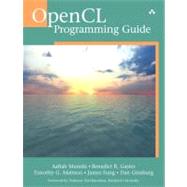OpenCL Programming Guide
, by Munshi, Aaftab; Gaster, Benedict; Mattson, Timothy G.; Fung, James; Ginsburg, Dan- ISBN: 9780321749642 | 0321749642
- Cover: Paperback
- Copyright: 7/13/2011
Using the new OpenCL (Open Computing Language) standard and framework, you can write applications that access allavailable programming resources: CPUs, GPUs, accelerators, and even external processors. Already implemented by Apple, ATI, NVIDIA, and other leaders, OpenCL has outstanding potential for PCs, servers, handheld/embedded devices, high-performance computing, and even cloud systems. This is the first comprehensive, authoritative, and practical guide to OpenCL 1.1 specifically for working developers and software architects. Authored by five leading OpenCL authorities, OpenCL Programming Guidecovers the entire specification. It reviews key use cases, shows how OpenCL can express a wide range of parallel algorithms, and offers complete reference material on both the API and OpenCL C programming language. Through complete case studies and downloadable code examples, the authors show how to write complex parallel programs that decompose workloads across many different devices. They also present all the essentials of OpenCL software performance optimization, including probing and adapting to hardware. Coverage includes Understanding OpenCL's core models, concepts, terminology, goals, and rationale Discovering and preparing available resources Programming with OpenCL C, its built-in functions, and runtime API Using buffers, sub-buffers, images, samplers, and events Sharing and synchronizing data with OpenGL and Microsoft's Direct3D Simplifying development with the C++ Wrapper API Using OpenCL Embedded Profiles to support devices ranging from cellphones to supercomputer nodes Building complete applications: image histograms, edge detection filters, physics simulations, Fast Fourier Transforms, optical flow, and more Using OpenCL with PyOpenCL, including issues in porting from C++ to Python Performing matrix multiplication and high-performance sparse matrix multiplication







